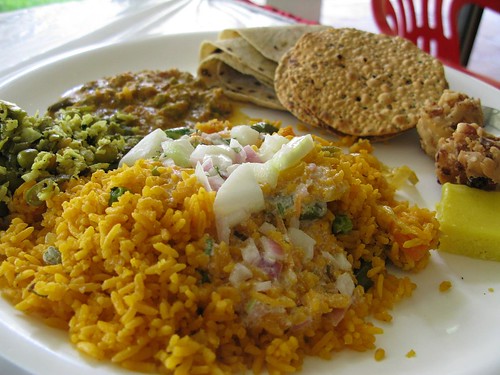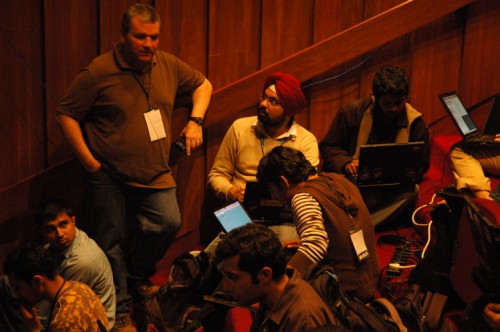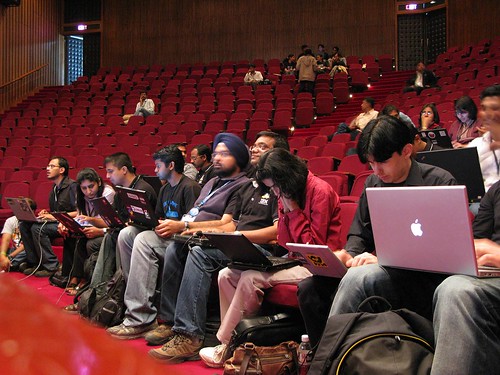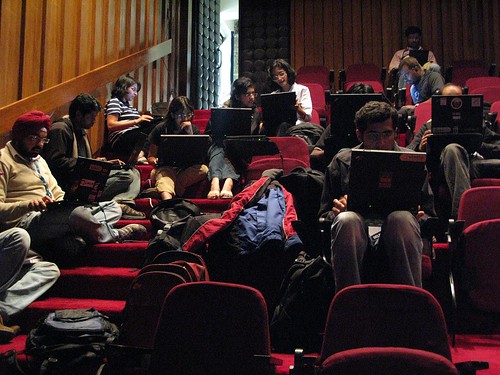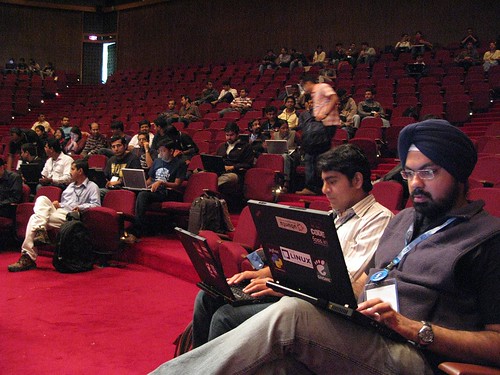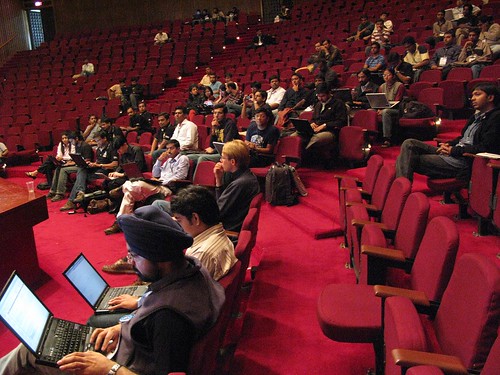I eventually took the plunge, upgraded to Fedora 9, the day it was released. What makes my desktop very interesting is that I have an "Nvidia" video card. I upgraded from Fedora Core 8 to Fedora 9. Notice the word core is gone in 9, that's because the core and extras repositories were merged in this release.
I often ask myself, why did I upgrade so quickly - as an after thought. The answer is that I like to try new stuff, I am excited by change, new features, the possibility of getting something better quickly. I think that's the open source philosophy as well "
Release early, Release often"
The new features do come at a cost though. I had to spend a few hours trying to bring up my X. Nvidia is not supported as an in kernel driver, there is a proprietary driver for it. Here's what I tried
- I used the VESA driver, but I was not happy about the missing graphics acceleration and open GL support
- I tried the nvdia driver from livna, but that had other problems - including complaints about ABI not matching. I tried the trick of starting X with -ignoreABI and setting the option in xorg.conf
- I wanted to try the driver directly from nvidia, but the kernel compile failed. I got patches from nvidia for 2.6.25 and ran into the same ABI issue. Ignoring ABI was not an option, since the shared library module for the nvidia driver uses a symbol that is now missing with the new X that comes bundled with Fedora 9
Disappointed, I went back to step 1 and I'll wait for the solution to come by or take a shot at a good solution myself. Downgrading X is not a good option, so I am going to hold on to that thought.
While configuring the X server, I remembered my first X install (Slackware, around 1999 or 2000). It came with a utility called xf86config, that asked a set of questions and generated a XFree86 configuration file, with a warning that getting the vertical and horizontal frequencies incorrect could fry the video card. Life is much better with Fedora 9, but not all that easy.
Although, I am beginning to like Fedora better than Ubuntu, Fedora's GUI package management sucks. Yumex is the closest thing it has for sane package management, the gnome based pirut, pacakgeit, etc all leave a user wondering what is going on in the background. I would highly recommend installing yumex and using it as the package manager
Fedora 9 comes with a bunch of kernel features - cgroups, cpu controller, cpu accounting controller and the namespace controller. I had a hand in some of these controllers, but unfortunately the memory controller has been disabled.
Fedora 9 comes bundled with FireFox 3 beta 5 (same as Ubuntu Hardy), FireFox 3 seems pretty cool in terms of user friendliness and stability. Downloading updates can be quite painful, unless you happen to know a very good and fast mirror. Most of the times I've tried to download updates, I get an error stating that the mirror is down or "no such file or directory" or "too many users". I guess that is expected since the whole Linux world is trying to get their hands on Fedora 9.
I found printing to be friendlier and more intuitive. I got errors correctly, stating that my printer was running low on ink or there was a paper jam. The print UI seemed quite robust and stable.
I tried KDE4, only to be a little disappointed. KDE4 on Fedora 9 is definitely much better than it is on kubuntu. Settings are well integrated and one has control over KDE4, unlike kubuntu where the controls are still for KDE3. The reason, I was disppointed with KDE was the interactiveness and latency in terms of response. The new UI is flashy, but most of my widgets failed to work (the comic widget and the dictionary widget, for example). The rendering of gtk based applications is quite poor. Most GUI on Linux seems to use the gtk widget library and some use Qt4. Firefox, eclipse, emacs, etc do not look very nice under KDE. These are still early days for KDE4, I hope it will mature soon into something I would want to use.
OpenOffice 2.4 was pleasantly surprising. As always, they seemed to have improved integration with documents and the generated pdf's look really nice. Usability is much nicer and so is the rendering and interactiveness. I would like to give them a thumbs up for this release. The major difference I saw with respect to Ubuntu's Hardy release was that there was no Sun Logo embedded in the splash screen of OpenOffice. I need to see why Hardy has the Sun Logo embedded.
I am glad to see (this was some time back as well) that Adobe and Google now have Fedora yum repositories, which is a very good sign. I wish nvidia would provide similar repositories.
I've just started using Fedora 9, I'll blog more on it, as I experiment and play with it.
 We know that if
We know that if  then the sum converges to
then the sum converges to
 which expands to
which expands to




